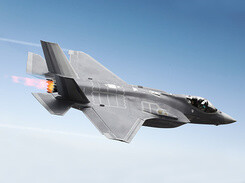Renewed emphasis on stealth, sensor fusion, MUM-T, and active protection systems will ignite new growth opportunities, finds Frost & Sullivan
 The global combat aircraft market is set for rapid growth. Geographical instability, territorial and border disputes, and the need to replace ageing fleets with modern fourth-/fifth-generation multirole fighters that have longer ferry range, higher payload capacity, and better survivability against integrated air defence networks are key factors fuelling a phenomenal CAGR of 39.0% to 2026. Frost & Sullivan anticipates planned and perceived modernisation and procurement opportunities in the market to exceed $101 billion and revenues to reach $493.14 billion by 2026.
The global combat aircraft market is set for rapid growth. Geographical instability, territorial and border disputes, and the need to replace ageing fleets with modern fourth-/fifth-generation multirole fighters that have longer ferry range, higher payload capacity, and better survivability against integrated air defence networks are key factors fuelling a phenomenal CAGR of 39.0% to 2026. Frost & Sullivan anticipates planned and perceived modernisation and procurement opportunities in the market to exceed $101 billion and revenues to reach $493.14 billion by 2026.
“Geopolitics aside, the combat fleet in many countries such as India, Vietnam, and Malaysia are reaching obsolescence fast and replacements must be procured to ensure that power projection capabilities of these countries are maintained. There is a global renewed emphasis on stealth, sensor fusion, manned-unmanned teaming (MUM-T) capability, and active protection system upgrades,” said Arjun Sreekumar, Industry Analyst, Defence at Frost & Sullivan. “To harness lucrative growth opportunities, players should offer a combination of low-cost platforms, aggressive marketing, and flexible payment mechanisms.”
For further information on this analysis, please visit: http://frost.ly/331
Growth opportunities from a regional perspective include:
- Geopolitical issues necessitate new procurement and modernisation in the Middle East in countries such as Qatar, Saudi Arabia, and the United Arab Emirates
- Modernisation of existing systems or procurement of second-hand aircraft rather than pursuing expensive acquisition programs in former Soviet bloc countries and other developing countries with smaller economies or low economic growth
- Collaborative new platforms planned in Europe (Franco-German next-generation fighter) and the Asia-Pacific region (Japan and Indonesia)
- Russia and China modernising quickly and phasing out outdated inventory
- The United States seeking several upgrade programs for its current combat aircraft inventory to extend service lives into the 2030s, until the F-35 and new fifth-/sixth-generation multirole fighters can be procured
“Older generation combat aircraft will find future air combat environments challenging in the face of new air and ground-based sensors and weapons capabilities, increased digitalisation of battlespace, and forces moving towards collaborative network-centric operations,” noted Sreekumar. “The installation of new generation electronic countermeasures will be a minimum survival requirement in a rapidly evolving environment.”
Frost & Sullivan’s recent analysis, Global Combat Aircraft Market, Forecast to 2026, covers the global market for new aircraft and upgrades specific to combat aircraft. It lists the key aircraft fielded by different countries based on their mission and types and traces their upgrade evolution. Segments such as strike, fighter, and multirole fighter across fixed-wing aircraft types are assessed with market share and the competitive environment discussed for players such as Lockheed Martin, Boeing, Dassault Aviation, Saab, Eurofighter Jadflugzeug GMBH, Mikoyan MiG, and Sukho. Revenues are broken down by new procurements, upgrades, regions, and combat aircraft types.
About Frost & Sullivan
For over five decades, Frost & Sullivan has become world-renowned for its role in helping investors, corporate leaders and governments navigate economic changes and identify disruptive technologies, Mega Trends, new business models and companies to action, resulting in a continuous flow of growth opportunities to drive future success. Contact us: Start the discussion.
Global Combat Aircraft Market, Forecast to 2026
MD43-16
Contact:
Jacqui Holmes
Corporate Communications Consultant
E: [email protected]
Twitter: @FrostADS
LinkedIn: Frost & Sullivan’s Aerospace, Defence and Security Forum
Website: http://dev.frost.com/ADS



